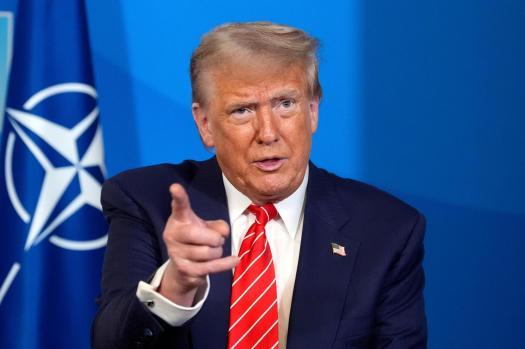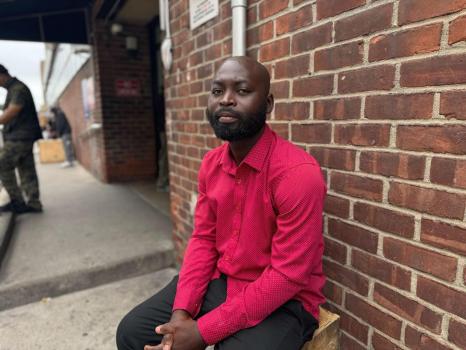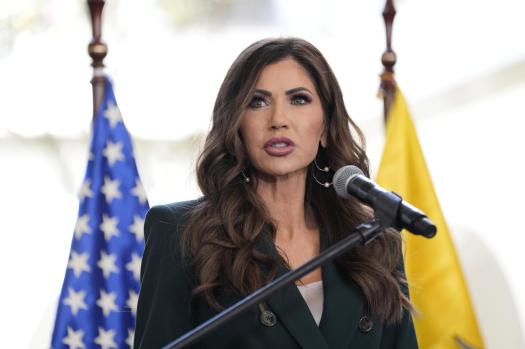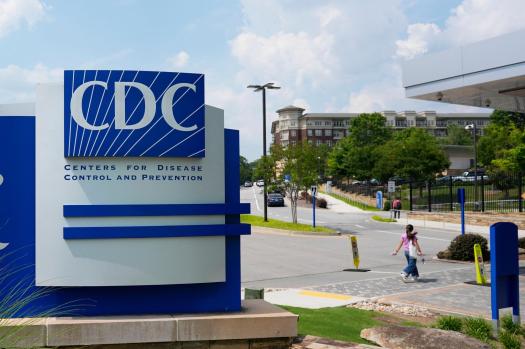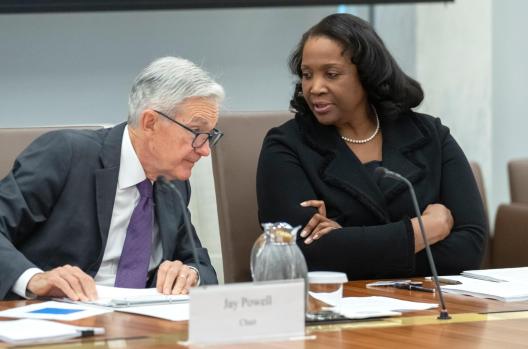By DARLENE SUPERVILLE and SEUNG MIN KIM, Associated Press
THE HAGUE, Netherlands (AP) — U.S. President Donald Trump concluded his attendance at the annual NATO summit on Wednesday, confronting an alliance that had largely complied with his demands.
Much of the annual summit in The Hague appeared to be tailored to the whims and worldviews of the Republican president, whose America First foreign policy philosophy minimizes the significance and power of multilateral coalitions. This was a far cry from the acrimonious gatherings of Trump’s first term.
After spending less than twenty-four hours in the Netherlands, Trump returned to Washington with a big policy change that he had been advocating since 2017: a large increase in defense expenditure by other NATO nations, which he has long accused of stealing from the United States. Russia’s invasion of Ukraine received only a brief mention in the summit’s official declaration, and Ukrainian President Volodymyr Zelenskyy’s presence at the meeting was significantly reduced.
A day after shocking the 32-nation alliance by being vague about the deal, Trump confirmed on Wednesday that he would uphold Article 5 of the NATO treaty, sending NATO scrambling for assurances that the United States will continue to adhere to the group’s smutual defense pledge.
I support it. When pressed to explain his position on Article 5, Trump responded, “That’s why I’m here.” I wouldn’t be here if I didn’t support it.
During a press conference later Wednesday, Trump seemed thoughtful as he talked about being inspired by other NATO nations who were driven to increase their own defense spending.
Trump remarked, “I left here differently,” adding that they need the United States to safeguard their nation and that things won’t be the same without it. These folks genuinely adore their countries, I said as I walked away. It’s not a copy. And we’re here to support them in defending their nation.
Just one day before, he had pondered that your interpretation of Article 5 would determine whether he complied with the treaty.
The reciprocal kudos in The Hague on Wednesday contrasts sharply with Trump’s earlier criticism of the alliance, whose worth he had long questioned. It also mirrors the attempts of other international leaders in the first few months of Trump’s second term to speak to the volatile president in his own words, which are flattering and full of superlatives.
In February, British Prime Minister Keir Starmers went to the Oval Office to personally deliver a second state visit invitation from King Charles III, which Starmer described as unique. In keeping with Trump’s campaign slogan, Italian President Georgia Meloni has pledged to restore Western greatness. In a letter to Mr. President, dear Donald, NATO Secretary-General Mark Rutte stated that his advocacy for higher alliance defense spending would contribute to the accomplishment of a goal that no American president in decades had been able to accomplish.
The 32 leaders signed a final summit statement that read, “To ensure our individual and collective obligations, allies commit to investing 5% of GDP annually on core defense requirements as well as defense- and security-related spending by 2035.”
Earlier in the day, Trump met with Rutte, whose private note of admiration the U.S. president posted on his Truth Social account. Trump said, “I’ve been asking them to go up to 5% for a number of years.”
Others have expressed concerns, and Spain has already formally stated that it cannot reach the goal. Trump expressed his annoyance at Spain’s choice and promised to have the nation compensate him by paying higher tariffs to the US as part of a trade agreement.
Spain is a member of the European Union, the biggest economic group in the world, which represents all 27 of its members in trade negotiations. They are not intended for one-on-one trade negotiations.
Trump took the stage at this year’s summit eight years after making his NATO debut in 2017, a meeting that is arguably most known for the way he shoved Montenegrin Prime Minister Dusko Markovic as the U.S. president pushed his way to the front of the group of world leaders during a tour of NATO headquarters.
However, compared to previous years, the environment surrounding Trump this week looked much more chummier.
The president was given the opportunity to spend Tuesday night at the Dutch royal palace, which he accepted. Trump claimed that Queen Maxima and King Willem-Alexander had a large, lovely heart and were both wonderful, lovely people.
Rutte, meanwhile, compared Trump to a father who must occasionally use forceful language to prevent a conflict between two warring organizations, a comparison the secretary-general made regarding the conflict between Israel and Iran.
Doesn’t he merit some recognition? When questioned if using “Daddy” for Trump made him seem weak, Rutte responded at a later press conference.
Other international leaders have sought ways to flatter Trump, but few have gone as far as Rutte, who has kept a positive relationship with the U.S. president since he returned to office.
In support of NATO partners’ increased defense expenditure, Lithuanian President Gitanas Naus da riffed on Trump’s campaign slogan, saying, “We should choose a motto: Make NATO great again.”
Related Articles
-
Trump voters cheer his move against Iran. MAGA leaders had warned the bombing could backfire
-
CDC nominee Susan Monarez sidesteps questions about disagreements with RFK in Senate hearing
-
Fed s Powell repeats warning about tariffs as some GOP senators accuse him of bias
-
California found in violation of Title IX in clash with Trump officials over transgender athletes
-
A look at how Trump s big bill could change the US immigration system
The German Chancellor, Friedrich Merz, responded, “I didn’t find it obsequious,” when asked about Rutte’s treatment of Trump.
“Of course it is and remains true that it was only this U.S. administration in combination with the war in Ukraine that prompted us to decide what we decided today,” Merz added, expressing it in a somewhat more somber manner.
The top Democrat on the Foreign Relations Committee, Senator Jeanne Shaheen of New Hampshire, who visited The Hague and met with a number of foreign leaders during the summit, said that other nations had legitimate concerns about the United States’ commitment to the alliance, especially in light of President Trump’s prior remarks.
Alongside Democratic Delaware Senator Chris Coons, Shaheen represented the U.S. Senate. “We were very strong and reassuring everyone that we are committed to NATO, we are committed to Article 5, and we are committed to maintaining troops on the Eastern flank,” Shaheen said.
This year’s event was clouded by the Israel-Iran war and the recent U.S. bombings against three Iranian nuclear sites. Following Trump’s Tuesday arrival in the Netherlands, the Associated Press and other news organizations reported that, contrary to Trump’s claims, a U.S. intelligence report indicated in an early assessment that Iran’s nuclear program had only been set back a few months by weekend strikes and was not entirely destroyed.
However, Trump and other top Cabinet members vehemently disputed the assessment on Wednesday morning, and Defense Secretary Pete Hegseth announced that the government was looking into who told media about the findings.
Schoof, Geert Wilders, the MP dubbed as the Dutch Donald Trump, and Zelenskyy were among the equivalents with whom Trump met one-on-one on Wednesday. Press coverage of the roughly hour-long meeting with Zelenskyy was prohibited by the White House. Trump later claimed that their meeting went well.
From Washington, Superville reported. This report was written by Associated Press writers Mike Corder in The Hague, Laurie Kellman in London, and Geir Moulson in Berlin.
